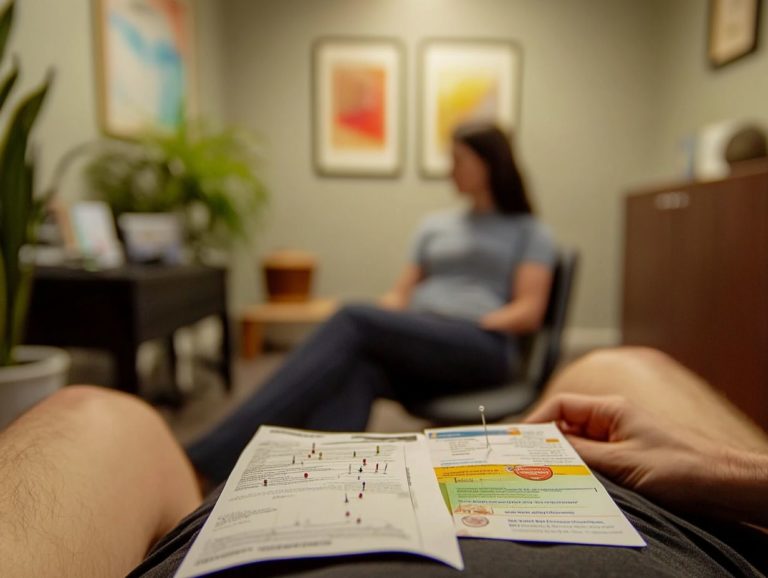How Acupuncture Works: The Science Behind the Needles
Acupuncture is an ancient practice steeped in Traditional Chinese Medicine that has garnered contemporary acclaim for its remarkable health benefits.
This exploration invites you to delve into its rich history and the scientific principles that explain how it operates. You’ll discover the myriad physical and mental health advantages it presents.
You’ll learn the distinctions between traditional and Western acupuncture methods, gain insight into what to expect during a session, and understand essential safety considerations.
Embark on this journey to unveil the captivating realm of acupuncture and its transformative impact on well-being.
Contents
Key Takeaways:
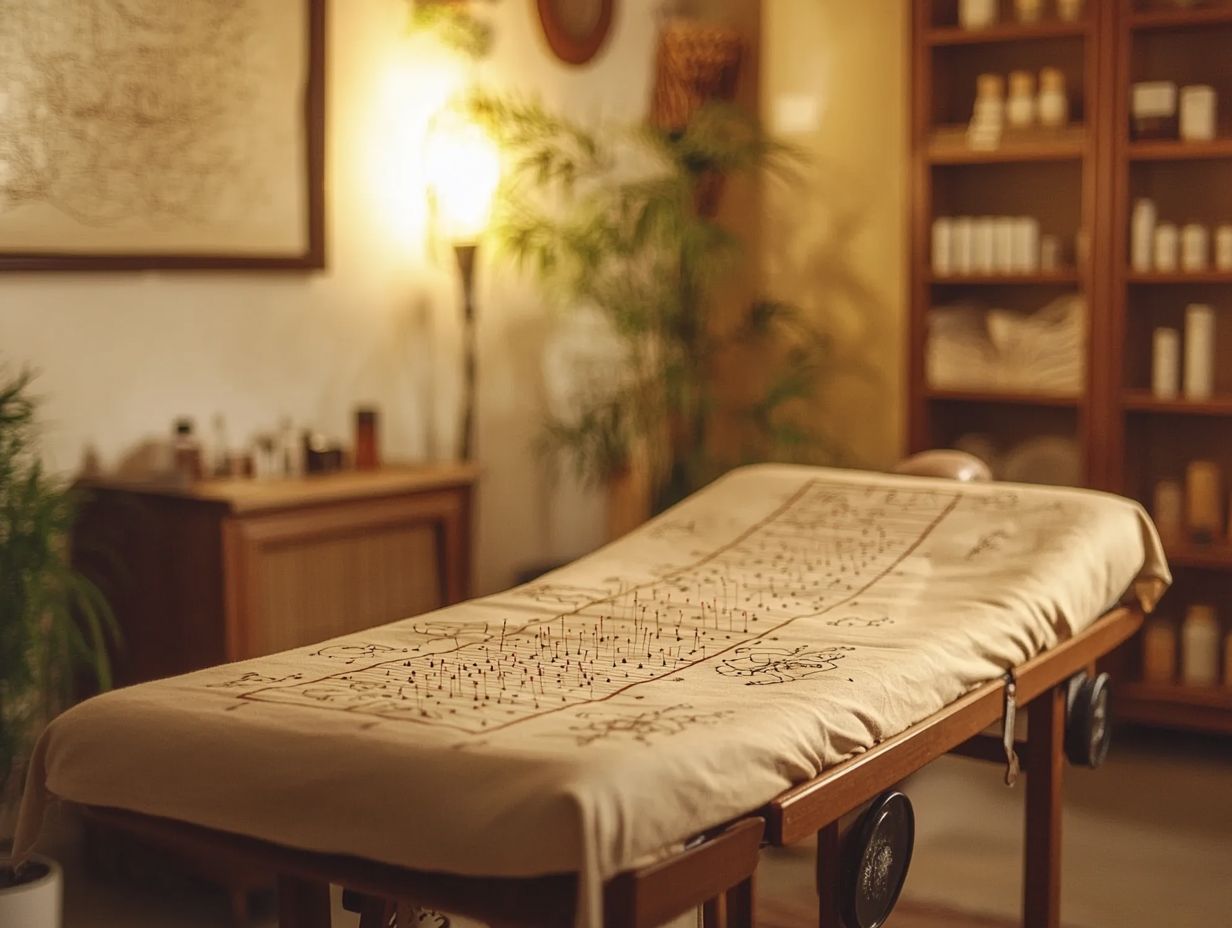
Acupuncture has been practiced for thousands of years and is recognized for its ability to promote healing by stimulating specific points on the body. It offers numerous benefits for both physical and mental health and is a popular form of alternative medicine.
Understanding Acupuncture
Acupuncture is a well-respected healing practice steeped in traditional Chinese medicine. It has been harnessed for millennia to enhance both physical and mental well-being by restoring the delicate balance of Qi, or energy flow, which is believed to be vital for health.
This ancient art employs meticulously placed acupuncture needles at specific points along meridians, addressing a multitude of health concerns, from chronic pain to mental health issues.
Research has shown that acupuncture effectively stimulates the release of neurotransmitters and enhances blood circulation, resulting in remarkable improvements in overall health and profound stress relief.
History and Traditional Use
The history of acupuncture stretches back over 2,500 years. It is rooted in the ancient Chinese tradition of healing, where it was used to restore health and balance by manipulating the body s vital energy, known as Qi.
This art has evolved over the centuries. It gracefully transcended cultural boundaries and adapted to various contexts. Ancient practitioners used needles crafted from materials like stone and bamboo to stimulate specific points along the meridians.
Initially met with skepticism, acupuncture has steadily gained recognition in modern healthcare, particularly for its effectiveness in addressing chronic pain, stress, and a host of other conditions.
Today, well-respected organizations like the World Health Organization and the National Institutes of Health acknowledge acupuncture, not just for its therapeutic potential, but also as a valuable complementary approach within integrative medicine.
How Acupuncture Works
Acupuncture operates by targeting specific points on your body, effectively influencing the flow of Qi. This practice promotes the release of neurotransmitters, such as endorphins and serotonin, which are essential for pain relief and play a significant role in your overall physiological well-being. To learn more about its origins, check out the history of acupuncture.
Exploring the Science Behind the Needles
Discover how this method activates pathways in your brain, leading to amazing pain relief! When acupuncture needles are expertly inserted at specific points, they can trigger the release of neurotransmitters, resulting in natural pain relief and a notable reduction in your body s stress response.
Research indicates that this method activates pathways in your brain that release endorphins your body s own natural pain-relieving chemicals. Studies have shown that acupuncture boosts levels of serotonin and dopamine, neurotransmitters essential for regulating mood and emotional well-being.
These biochemical changes do more than just alleviate pain; they promote a sense of calm that enhances your overall mental health. Findings highlight how acupuncture serves as a holistic approach to stress relief, allowing you to experience significant improvements in your overall health and quality of life.
Benefits of Acupuncture
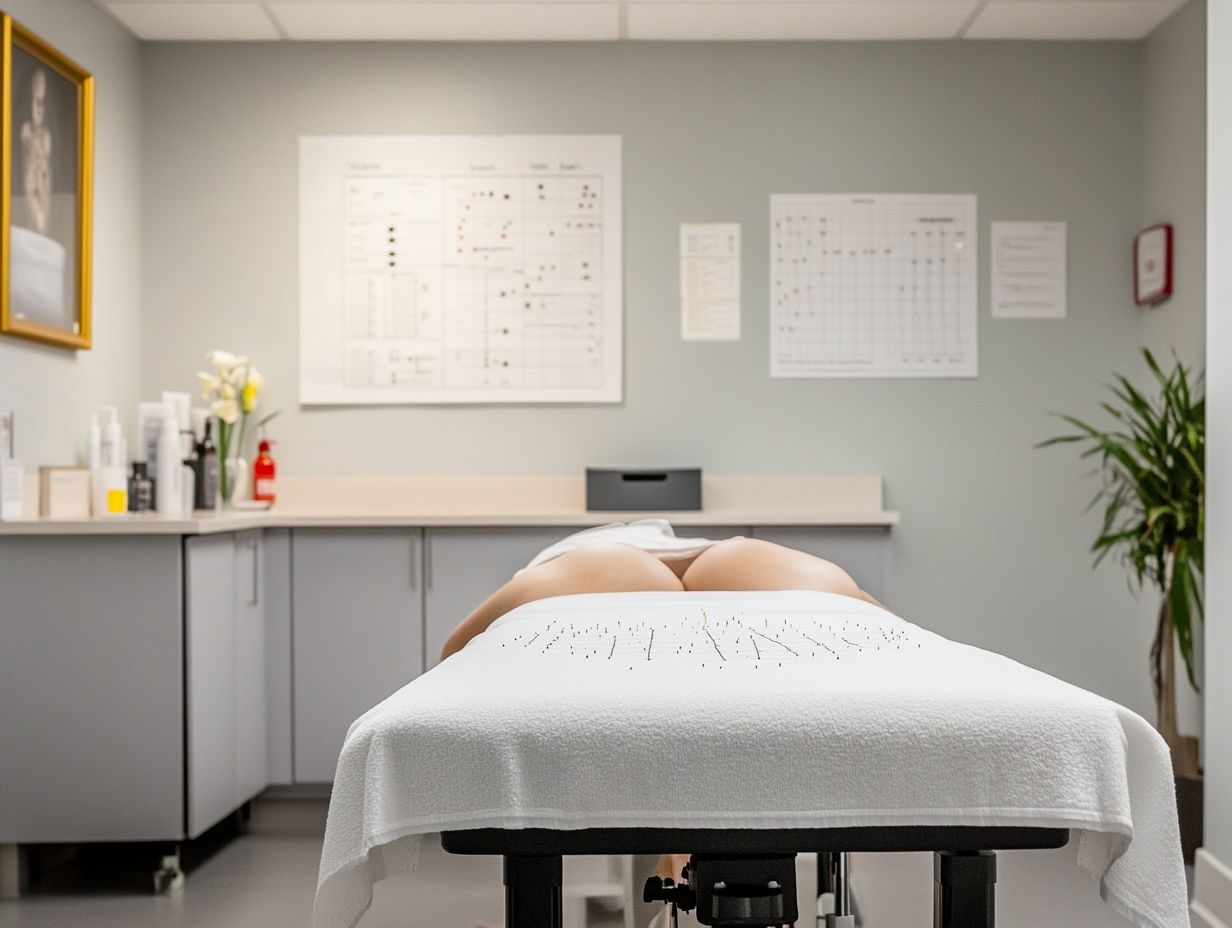
The benefits of acupuncture reach far beyond simple pain relief. This holistic approach to health beautifully intertwines physical and mental well-being.
It addresses a variety of concerns, including chronic pain management, anxiety, depression, and stress relief. Acupuncture is a comprehensive modality for enhancing your overall quality of life.
Physical and Mental Health Benefits
Experience the amazing benefits of acupuncture for your body and mind! It helps relieve chronic pain, balances hormones, and supports emotional health.
Research shows that about 70% of patients find significant pain relief after treatment. Many also feel more emotionally stable, making acupuncture a holistic option for pain management and emotional support.
Numerous studies demonstrate that acupuncture can reduce anxiety by stimulating the release of endorphins your body s natural painkillers. These comprehensive benefits highlight its potential as a viable alternative or complement to conventional treatments.
Types of Acupuncture
Discover various styles of acupuncture, from traditional Chinese medicine to medical acupuncture, each using distinct techniques tailored to meet individual health needs.
Traditional Chinese Medicine vs. Western Acupuncture
Traditional Chinese medicine acupuncture emphasizes restoring balance within your body s Qi (pronounced ‘chee’), while Western acupuncture adopts a more scientific approach, focusing on anatomical and physiological principles.
This perspective leads to distinct treatment plans based on each approach’s foundational beliefs. Traditional practices take a holistic view, acknowledging that emotions, environment, and lifestyle are crucial to your health.
Practitioners assess your body s energy flow through techniques like pulse and tongue diagnosis. This allows them to craft personalized strategies aimed at harmonizing your internal energies.
In contrast, Western acupuncturists rely on established clinical research and employ a targeted method that addresses specific symptoms or conditions. This scientific lens provides a standardized treatment approach, appealing to patients seeking evidence-based solutions.
What to Expect During an Acupuncture Session
During an acupuncture session, expect an in-depth consultation with a skilled practitioner. They will evaluate your unique health needs before expertly inserting acupuncture needles at targeted points to initiate your healing process.
Procedure and Common Techniques
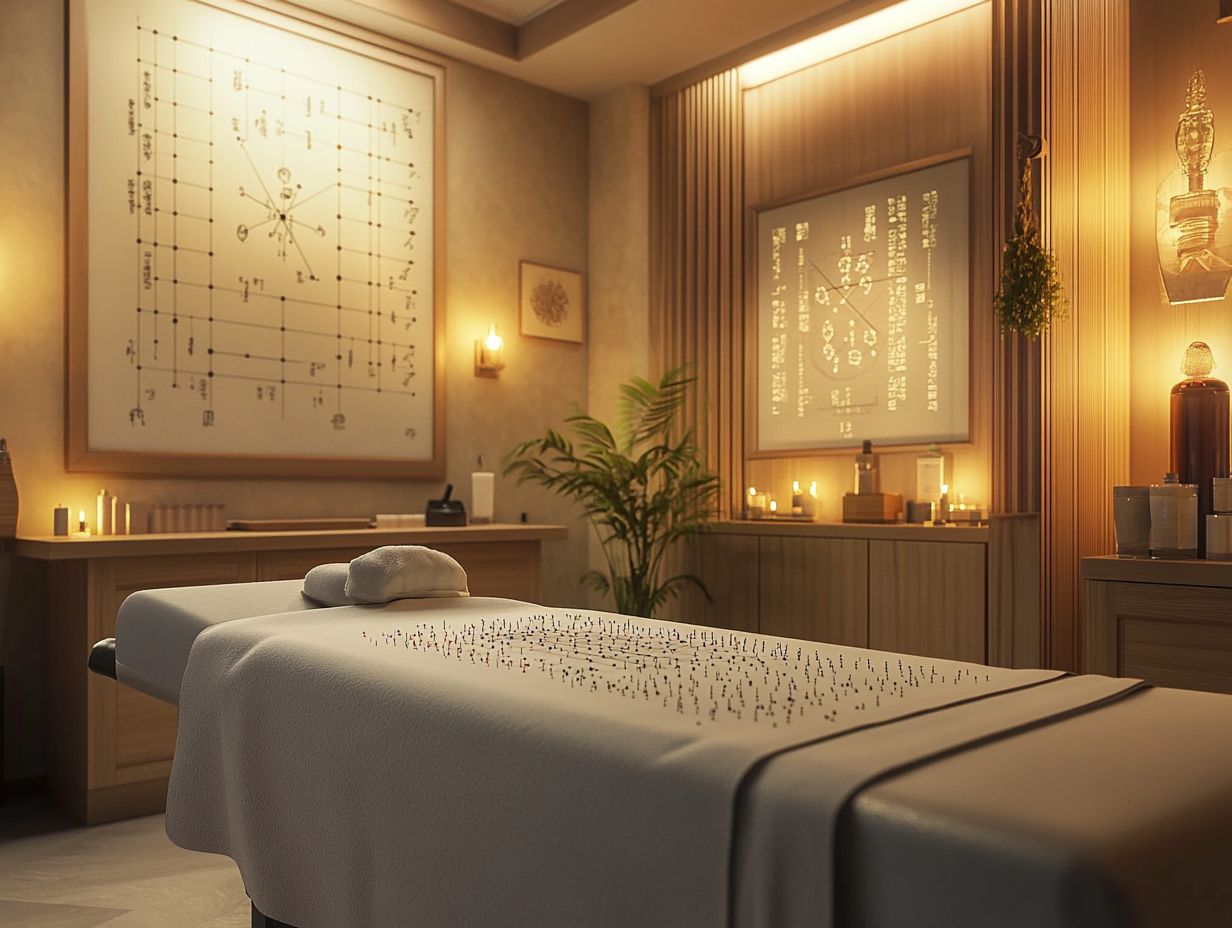
The acupuncture procedure involves precise needle insertion at various points by skilled practitioners. Techniques such as needling, electroacupuncture, and cupping optimize your treatment options.
During a session, your practitioner may choose from various needle types, including stainless steel or gold-plated options, each offering unique benefits tailored to your needs.
Placement strategies are often customized. Some practitioners may focus on traditional meridian points, while others take a contemporary approach, addressing specific symptoms or areas of discomfort directly.
Your session may also include adjunct therapies like cupping. This technique enhances circulation and relieves tension by creating suction on the skin, complementing the effects of needle insertion for a more holistic healing experience.
Safety and Side Effects of Acupuncture
Acupuncture is widely regarded as a safe treatment option, especially when performed by trained and skilled practitioners.
While most individuals can expect a positive experience, some may encounter mild side effects, such as bruising or temporary discomfort at the needle insertion site.
Addressing Concerns and Risks
Addressing concerns about acupuncture means understanding the potential risks involved and the safety measures qualified practitioners implement to minimize complications and ensure effective care.
You might hesitate to pursue acupuncture due to worries about needle pain or fears of infections from unsterilized equipment. These concerns are completely valid; it s crucial for you to feel confident in your treatment choices.
Certified practitioners follow strict hygiene protocols, using single-use, sterile needles to eliminate any risk of cross-contamination. They expertly assess your comfort levels and adjust needle depth and technique to promote relaxation rather than discomfort.
By debunking these myths and highlighting the safety guidelines practitioners adhere to, you can feel more at ease and informed as you explore acupuncture on your wellness journey today!
Frequently Asked Questions
What is acupuncture and how does it work?
Acupuncture is a form of traditional Chinese medicine that involves inserting thin needles into specific points on the body to stimulate healing. For those interested in learning more, understanding the basics of acupuncture can provide valuable insights into how it works by promoting the flow of qi, the body’s vital energy, along meridians in the body.
What is the science behind acupuncture?
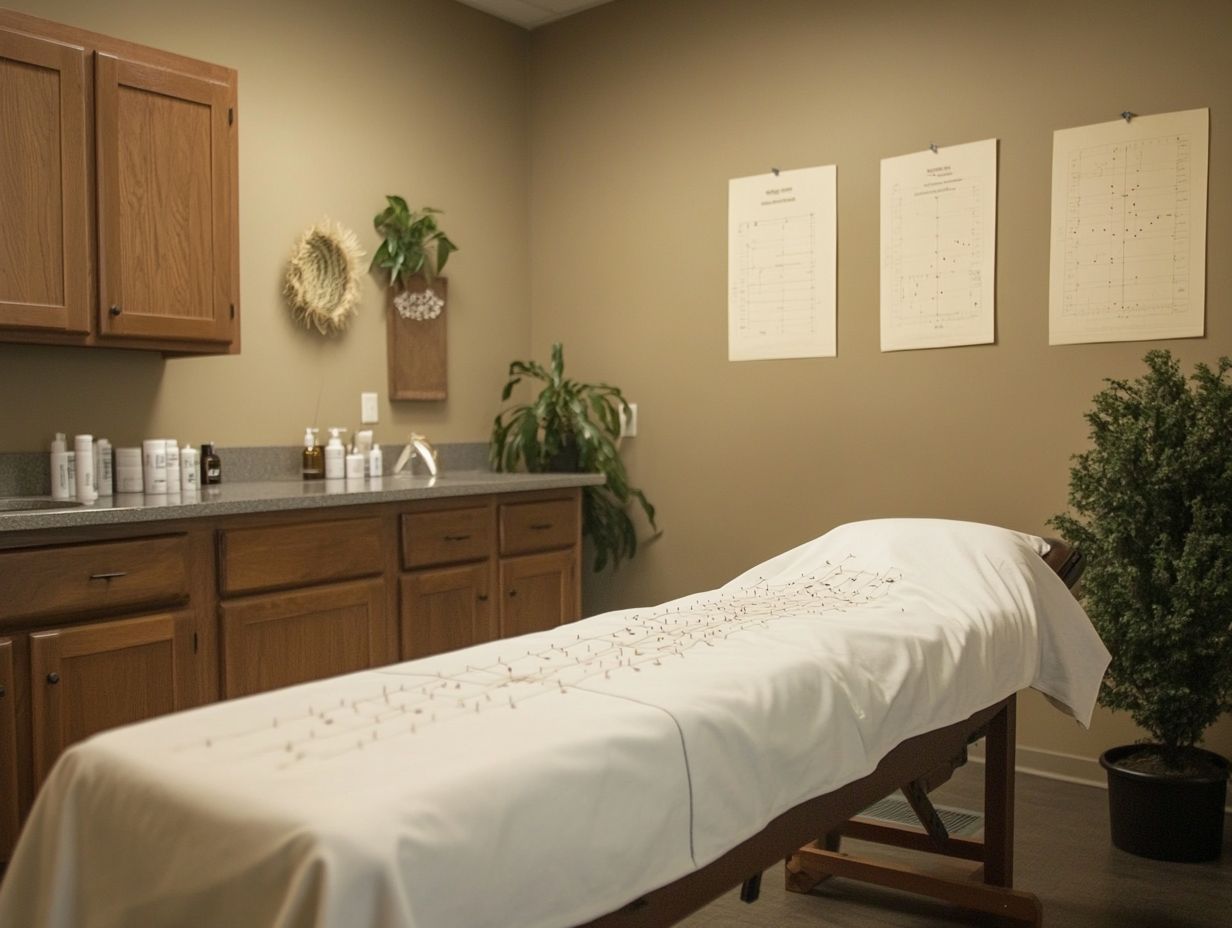
The science behind acupuncture is based on the theory that the needles stimulate the body’s nervous system, releasing chemicals that can help alleviate pain and promote healing. It also increases blood flow and activates the body’s natural painkillers.
How do the needles used in acupuncture work?
The needles used in acupuncture are extremely thin and are inserted into specific points on the body known as acupoints. Understanding the philosophy behind acupuncture reveals how these needles stimulate the nerve endings in the skin and muscles, triggering a response in the body’s central nervous system.
What conditions can acupuncture help treat?
Acupuncture has been shown to be effective in treating a variety of conditions, including chronic pain, headaches, digestive issues, allergies, anxiety, and depression. It can also be used as a complementary treatment for other medical conditions.
Is acupuncture safe and does it have any side effects?
Acupuncture is generally considered safe when performed by a licensed and trained practitioner. However, some people may experience minor side effects like bruising, soreness, or dizziness. Don t hesitate to discuss your concerns with your practitioner before beginning treatment!
How long does it take for acupuncture to work?
The time it takes for acupuncture to work varies depending on the individual and the condition being treated. Some people may experience immediate relief, while others may require multiple treatments over time. It is important to discuss your specific treatment plan and expectations with your practitioner.
Interested in learning more about acupuncture? Consider booking a session to experience its benefits firsthand!






